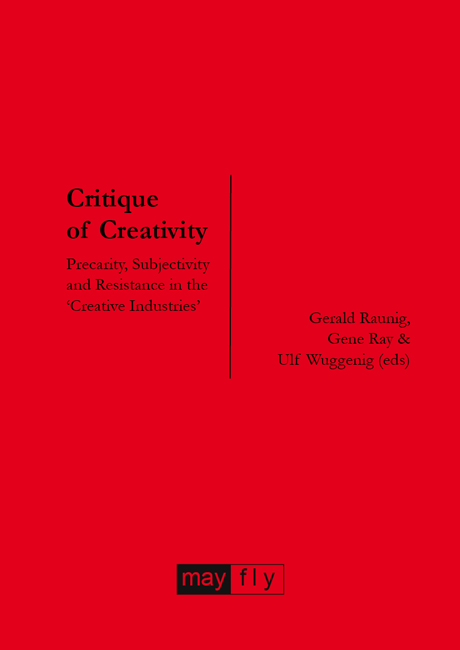Gerald Raunig, Gene Ray, Ulf Wuggenig (eds.): Critique of Creativity: Precarity, Subjectivity and Resistance in the ‘Creative Industries’ (2007–) [DE, EN]
Filed under book | Tags: · creative industries, creativity, critique, precariat, precarity, resistance, subjectivity

“Creativity is astir: reborn, re-conjured, re-branded, resurgent. The old myths of creation and creators – the hallowed labors and privileged agencies of demiurges and prime movers, of Biblical world-makers and self-fashioning artist-geniuses – are back underway, producing effects, circulating appeals. Much as the Catholic Church dresses the old creationism in the new gowns of ‘intelligent design’, the Creative Industries sound the clarion call to the Cultural Entrepreneurs. In the hype of the ‘creative class’ and the high flights of the digital bohemians, the renaissance of ‘the creatives’ is visibly enacted. The essays collected in this book analyze this complex resurgence of creation myths and formulate a contemporary critique of creativity.”
With contributions by: Brigitta Kuster, Maurizio Lazzarato, Esther Leslie, Isabell Lorey, Angela McRobbie, Raimund Minichbauer, Monika Mokre, Stefan Nowotny, Marion von Osten, Gerald Raunig, Gene Ray, Suely Rolnik, Vassilis Tsianos, Paolo Virno, Ulf Wuggenig
Publisher mayfly, London, in conjunction with the European Institute for Progressive Cultural Policies, 2011
Creative Commons Attribution-Noncommercial-No Derivative Works 3.0 Unported License
ISBN 9781906948139
234 pages
Publisher (new ed., DE)
Publisher (EN)
PDF, PDF, EPUB, EPUB (German, 2007/2016, updated on 2020-11-13)
PDF, PDF (English, updated on 2020-11-13)
Ned Rossiter: Organized Networks: Media Theory, Creative Labour, New Institutions (2006)
Filed under book | Tags: · creative industries, critique, democracy, governance, information society, intellectual property, internet, labour, media theory, networks, technology

The celebration of network cultures as open, decentralized, and horizontal all too easily forgets the political dimensions of labour and life in informational times. Organized Networks sets out to destroy these myths by tracking the antagonisms that lurk within Internet governance debates, the exploitation of labour in the creative industries, and the aesthetics of global finance capital. Cutting across the fields of media theory, political philosophy, and cultural critique, Ned Rossiter diagnoses some of the key problematics facing network cultures today. Why have radical social-technical networks so often collapsed after the party? What are the key resources common to critical network cultures? And how might these create conditions for the invention of new platforms of organization and sustainability? These questions are central to the survival of networks in a post-dotcom era. Derived from research and experiences participating in network cultures, Rossiter unleashes a range of strategic concepts in order to explain and facilitate the current transformation of networks into autonomous political and cultural ‘networks of networks’.
Publisher: Eelco van Welie, NAi Publishers, Rotterdam
In association with the Institute of Network Cultures, Amsterdam
ISBN 9056625268, 9789056625269
250 pages
Geert Lovink, Ned Rossiter (eds.): MyCreativity Reader: A Critique of Creative Industries (2007)
Filed under book | Tags: · cognitive capitalism, creative industries, creativity, critique, cultural production, culture industry, labour
“The MyCreativity Reader is a collection of critical research into the creative industries. The material develops out of the MyCreativity Convention on International Creative Industries Research held in Amsterdam, November 2006. This two-day conference sought to bring the trends and tendencies around the creative industries into critical question.
The “creative industries” concept was initiated by the UK Blair government in 1997 to revitalise de-industrialised urban zones. Gathering momentum after being celebrated in Richard Florida’s best-seller The Creative Class (2002), the concept mobilised around the world as the zeitgeist of creative entrepreneurs and policy-makers. Despite the euphoria surrounding the creative industries, there has been very little critical research that pays attention to local and national and variations, working conditions, the impact of restrictive intellectual property regimes and questions of economic sustainability. The reader presents academic research alongside activist reports that aim to dismantle the buzz-machine.”
Editorial assistance: Sabine Niederer
Publisher Institute of Network Cultures, Amsterdam, 2007
Creative Commons Attribution Noncommercial No Derivative Works 2.5 Netherlands License
ISBN: 9879078146049
274 pages


